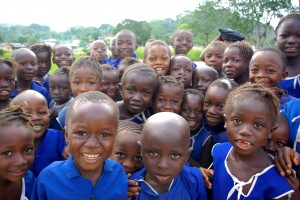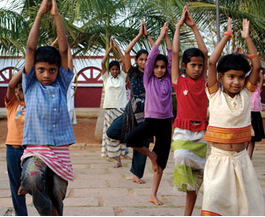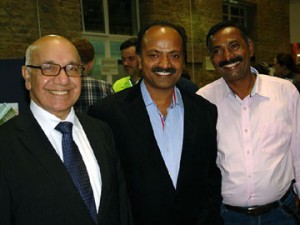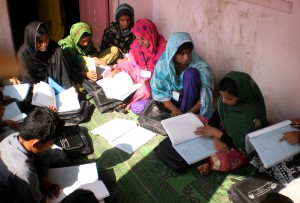Seeking out the unsung heroes
March 2015
This interview was originally published on Pearl Works website, available here.
As the number of Ebola orphans in Sierra Leone reaches 15,000, Tricia Young tells us how she came to work for the organisation Child to Child, which is using radio to reach young people most in need.
by Charles Capel

CC: Tricia, would you be able to tell me a little about who you are, and what motivates you?
TY: I suppose the thread that connects everything that I have done professionally is a commitment to combatting inequalities, and the injustices that arise as a consequence of inequality. I am mixed race, my dad is afro-Caribbean and my mum is white European, and from a young age I became quite aware of racism. I grew up in North London in the 1970s and 80s. There was a whole series of race riots in the 80s in North London.
Riots are often driven by young people who are marginalised and voiceless and turn to violence as a means of expressing what they are trying to say. I don’t condone that, but I do think if you don’t make meaningful space for young people to be listened to, and to be taken seriously and to have their concerns heard, then ultimately this is where it ends up.
I went to Nottingham University and did my first degree in American Studies. I wanted to study America because I was interested in the history of race relations, the civil rights movement, and the history of slavery in the US.
CC: Why does inequality matter?
TY: Because it means that people’s views simply get disregarded by virtue of their age, gender, ethnicity, religion, or poverty. We are just writing off huge swathes of the population both here in the UK and globally. It’s fundamentally unjust and unconscionable and a huge waste of human potential which means that our societies are not as good as they can be. It could be one of these people who finds a cure for cancer, or helps us figure out the solution to the fossil fuel crisis.

CC: At what point did you start your journey to where you are now?
TY: I was diagnosed with breast cancer at 33, and I was two years into a part time PhD; I stopped doing that, and took time out for my treatments. When I came back I realised that I wasn’t happy and I had gone off on a tangent.
CC: Had that experience changed things for you?
TY: Yes very much. It really massively lit the fire in my belly about wanting to engage with the things that I felt passionate about. I became involved on a trustee level, and was subsequently chair of an organisation called Eaves for Women because they were running an anti-trafficking initiative. They were supporting women who had been trafficked into the UK to be sexually exploited.
I went to India and I volunteered with this organisation called Odanadi, which is based in Mysore. They were a very small NGO, and financially very insecure, so I came back and I set up an organisation to support them. We’ve now raised several hundred thousand pounds for them in the last eight years and we also run an annual international fundraising campaign that takes place globally called ‘Yoga stops traffic.’

CC: Tell me about your experience in India, was there any one moment that really changed things for you?
TY: I think it was the integrity of the guys that run the organisation, Stanly and Parashurama. It was the quality of their humanity. You know you meet people who are just really stellar human beings, willing to challenge the systematic human rights abuses of those who are unable to do so themselves and working alongside and supporting women and children in especially vulnerable communities to claim their rights, and they really epitomise to me what it means to be a good person.

There are lots of ordinary unsung heroes who I find inspiring. I find they are all people who have a really strong values base, and have an enormous amount of integrity.
CC: Did you look up to them?
TY: I don’t really do looking up to: it’s not really my style! I just have enormous amounts of respect for them.
To be honest I’m not particularly inspired by famous people, not because they’re not inspiring, but just because it’s a package that you get. They’re a brand. It’s not my mentality to connect things like that – I’m sort of fairly indifferent!

When my daughter was about 18 months old I became the director of Child to Child, the organisation I am with now. Child to Child is an organisation that epitomises the values that I hold dear.
It champions children’s right to be listened to and taken seriously. The Child to Child approach, developed in 1979, inspires children to work together to change their world, leading to healthier, safer lives and better access to school.
For instance Child to Child implemented a school readiness project jointly with Unicef between 2007-2010, called ‘Getting Ready for School: a Child to Child approach.’ This was set up to mitigate the lack of formal pre-schools and other early learning opportunities for many children in developing countries.
It built on the natural process of younger children learning from and interacting with older children. Through this approach, we’ve seen how a younger child can develop learning skills and is then better prepared to start school at the right age. The older child also benefits, developing confidence and self-esteem.
CC: Child to Child is currently running a major project about Ebola in Sierra Leone. Can you tell me more?
TY: It is really exciting, and has come from the depths of the most desperate situation really. We were talking to our partners, the Pikin to Pikin Movement, about the struggles that they were facing on a day-to-day basis as the consequence of Ebola.
Last August we learnt that one of the community volunteers on the project had lost all nine members of her family in the space of a few days. She lost her new-born baby, her mother, her father, her brothers, her sisters. We had an emergency meeting and we decided that producing radio programmes in partnership with children was the way to go.
CC: What made you choose radio?
TY: It is the main means of communication that the majority of people in Sierra Leone have access to, that doesn’t require people congregating. The last thing you want to do in this situation is to encourage people to come together because you could be putting people’s lives at risk, and also we felt it was an opportunity to adapt our programme in a new way that could potentially provide a model and a template that we could take elsewhere.
What has become very apparent in the last couple of years is that there is a real push back against education in certain parts of the world, including in one of our own project areas in Sindh province, Pakistan.

You know, people don’t want children to be educated. There are numerous sets of circumstances around the world where the traditional approach to the provision of education, using schools and teachers, and so on is problematic.
So if you can have a product that you can deliver on radio, that may be a way of enabling children to have some level of access to education whilst these other broader, more challenging issues are addressed. So we decided to move into radio production in Sierra Leone, and what I think is really innovative is that we’re working in partnership with children, tapping into their unique skills, motivations and enthusiasm to make a difference to themselves and their communities.

